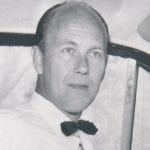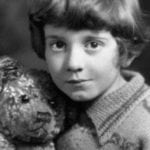 Movies and TV
Movies and TV  Movies and TV
Movies and TV  History
History 10 Dirty Government Secrets Revealed by Declassified Files
 Weird Stuff
Weird Stuff 10 Wacky Conspiracy Theories You Will Need to Sit Down For
 Movies and TV
Movies and TV 10 Weird Ways That TV Shows Were Censored
 Our World
Our World 10 Places with Geological Features That Shouldn’t Exist
 Crime
Crime 10 Dark Details of the “Bodies in the Barrels” Murders
 Animals
Animals The Animal Kingdom’s 10 Greatest Dance Moves
 Movies and TV
Movies and TV 10 Box Office Bombs That We Should Have Predicted in 2025
 History
History 10 Extreme Laws That Tried to Engineer Society
 History
History 10 “Modern” Problems with Surprising Historical Analogs
 Movies and TV
Movies and TV 10 Movie Adaptations That Ruined Everything for Some Fans
 History
History 10 Dirty Government Secrets Revealed by Declassified Files
 Weird Stuff
Weird Stuff 10 Wacky Conspiracy Theories You Will Need to Sit Down For
Who's Behind Listverse?

Jamie Frater
Head Editor
Jamie founded Listverse due to an insatiable desire to share fascinating, obscure, and bizarre facts. He has been a guest speaker on numerous national radio and television stations and is a five time published author.
More About Us Movies and TV
Movies and TV 10 Weird Ways That TV Shows Were Censored
 Our World
Our World 10 Places with Geological Features That Shouldn’t Exist
 Crime
Crime 10 Dark Details of the “Bodies in the Barrels” Murders
 Animals
Animals The Animal Kingdom’s 10 Greatest Dance Moves
 Movies and TV
Movies and TV 10 Box Office Bombs That We Should Have Predicted in 2025
 History
History 10 Extreme Laws That Tried to Engineer Society
 History
History 10 “Modern” Problems with Surprising Historical Analogs
10 Reasons Robin Williams Changed The Way We See The World
Robin Williams’ contributions to television and comedy are unparalleled, but more than that, he also put the spotlight on a number of things that otherwise might have been overlooked and gave countless people a new perspective on the world around them. The number of lives he changed in big ways and small is overwhelming, and for that, the world thanks him.
10 Moscow On The Hudson
Even after the Cold War, tensions have never gone through anything resembling a period of true calm between the United States and Russia. All too often, the actions of a government become the actions of its people, with the everyday man who struggles to make a living being conflated with the government that’s enforcing the policies.
In 1984’s Moscow on the Hudson, Williams brought a new face to the Russian everyman with his portrayal of a Russian saxophone player who become enamored with the American way of life and defected. Williams didn’t only learn to play the saxophone for the role, but he also learned to speak and write Russian. There were many, many Russian extras on the set, and Williams based his character on bits and pieces of many of them; he spent much of his downtime listening to their stories. They told him where they had come from, what they had been through, and where they hoped to go. The resulting movie was refused by the Cannes Film Festival for being too political, and in interviews, Williams said that he could only imagine what the Russian response would be to the movie that showed audiences just what sort of lives Russian citizens led, and one man who was willing to give all for something else. The movie itself was directed by the grandson of a man who had done just what Williams’ character did, and many of the most touching scenes—such as Vladimir being overwhelmed by the sight of an American grocery store—came right from stories told by other Russian immigrants, giving a face to those citizens who aren’t that much different than their American counterparts.
9 Equality In Online Gaming
Let’s face it: There’s always been something of a stigma attached to those of us who choose to spend our free time imagining we’re someone or something else. There’s a huge amount of the population that, when left with a free afternoon, will gladly hop online and become a dark elf shadowknight, a troll shaman, an elven bard . . . anything but what we have to be in the real world. There are probably as many different reasons for playing as there are people that play, but top on the list is that online gaming provides something of a retreat from the real world, a place where we can be what we want to be instead of what others see us as, where we can kill the bad guys (or good guys), and go home with the trophy.
Williams’s self-confessed addiction to online gaming leveled the playing field a bit. Nerds are no longer the stereotypical 40-somethings that live in their mothers’ basement; he helped put another face to the online gamer, and it went two ways. For the non-gaming community, it was a chance to see an older, successful man with a career and a family become engulfed in a fantasy world that seems a little weird to anyone who’s not a part of it. And for gamers, he was the successful family man who might be on the big screen, but he’s also in the trenches in the latest Call of Duty campaign as well, bridging a massive gap. While there will always be endless arguments between hard core gamers and the casual gamers, Williams’s face brought a different sort of equality to the mix—a reminder that everyone on the other side of the screen is human. Williams was also a longtime fan of other games as well, including Legend of Zelda. (If you haven’t watched the above commercials yet, watch them now.)
8 Good Morning, Vietnam
It goes without saying that the Vietnam War was, as a whole, very, very far from well received even for years after the official end of the war and the return of American troops. Good Morning, Vietnam wasn’t made until 1987, and it was based on the true story of Robin Williams’s character, Adrian Cronauer. While there were obvious liberties taken in telling the story, the real life Adrian Cronauer remembers it as truly something special. For the first time, Cronauer saw a truthful portrayal of what it was like to be an American fighting a war that wasn’t backed by most, and he saw a portrayal of what the soldiers there had really been like, out of the unfavorable, villainous light that they had so often been cast in. Cronauer—and Williams—made it a point to show the human side of the people, and to separate the individual from the war, the cause, and the people who were behind the scenes telling them what to do. It was a rare thing at the time, and it helped us all learn that while we might not support a war, we can support the people on the front lines. It was a sentiment echoed in Williams’s real-life friendship with the man he had portrayed; in spite of drastically different political viewpoints, their friendship endured.
7 Answering A Little Girl’s Dying Wish
Editor’s note: Please enjoy this unrelated clip from Jumanji.
Actions don’t have to be grand or world-encompassing to change everything for someone, and sometimes, that’s the most selfless thing we can do. In 2004, Make-A-Wish reached out to Williams to see if he would grant the wish of a young girl who had been diagnosed with terminal brain cancer. Jessica Cole was diagnosed when she was five years old, and one of her last wishes was to meet her hero. She was too weak to make the flight to California when the time came, so Williams chartered a plane and made the trip across the country to spend the day with the little girl. All done with relative secrecy, Jessica’s dad remembers the day his daughter got to spend playing cards and watching television with her idol, and says that it was one of the things that gave her strength in her final days—she passed away in December 2004. “He laughed, and he acted like he’d known her forever,” Jessica’s dad remembers. After her death, Williams had a redwood tree planted in her memory. His selfless act reminds us that we can all make a difference in the life of someone who needs a little spark of light.
6 Animal Rights
Editor’s note: If you take nothing else from this list, skip to 2:15 in this video and watch Robin Williams have a tickle fight with a gorilla.
One of the most selfless things a person can do is make the world a better place for someone that can’t say the words “Thank you” or tell you how much of a difference you have really, truly made in their lives. A life-long animal rights activist, Williams had an Instagram account filled with pictures of his furry friends—including his dog Leonard, who he rescued from a New York shelter. In 2001, Williams did some work in support of the Gorilla Foundation, and during that time he got the once-in-a-lifetime chance to meet Koko, the Gorilla Foundation’s sign language–speaking gorilla. Williams was truly moved by the idea that laughter could cross the boundaries of species, and the video of him sharing laughs and tickles with the gentle giant is truly moving. Koko remembered the meeting, too, noticeably saddened by the news of his death.
Williams also did a number of videos and short spots to raise awareness about a variety of animal issues, including the widespread slaughter of dolphins in Japan and the plight of those aquatic mammals that survive, only to be condemned to a life in a zoo. He was part of a PBS documentary called In the Wild—Dolphins With Robin Williams and also spent time volunteering with local branches of the Humane Society, posing for calendars to benefit Tony LaRussa’s Animal Rescue Foundation, and talking about his vegan lifestyle.
5 The Birdcage
In retrospect, there’s a lot about The Birdcage that seems campy, overdone, or even a little bit crass. The story of a gay couple who are trying to pretend to be straight in order to make a good impression on their son’s strictly conservative future in-laws can, at best, be described as something of a dated premise. But when put in the context of the time—the movie came out in 1996—it was little short of groundbreaking. Sure, the characters, played by Williams and Nathan Lane, were over the top and at the head of a cast of stereotypes, but look beyond that and you’ll find nothing short of a movie that’s dealing with the dynamics found in most of our families. It’s about the need to conform to a standard, to get along with people you might not necessarily agree with even if you are stuck with them at the holidays. At the time, a movie featuring the story of such an openly gay couple dealing with ordinary, everyday family problems was all but unheard of. To take on such a role was a massive leap of faith, one that showed just where Williams placed his values. Even today, there’s a lasting love of Williams, Lane, and The Birdcage at the filming location that it helped put back on the map. After hearing the news of Williams’s death, fans gathered at the South Florida hotel, The Carlyle, where a portrait of Williams sits on the front porch. They shared stories of how the movie touched them, how it was one of the first public, silver-screen statements that let them know that it was all right to be who they were inside, and how it still gives them strength.
4 Mrs. Doubtfire
Mrs. Doubtfire is another one of his classic movies that was alternately lauded and panned but, at the end of the day, reached a specific target audience with a very, very important message about divorce and the ever-present, never-ending relationship between a parent and their child. One of the many sites of impromptu memorials for Robin Williams has been the house where Mrs. Doubtfire was filmed (now, oddly and appropriately, it’s owned by a plastic surgeon specializing in transgender operations). Every family going through a divorce has different dynamics and different situations, but when there are children involved, one thing that is infinitely hard to explain is that the divorce and the changing situations are operating beyond them; it’s something that children often just can’t process, and for many children of divorce, there was something in Mrs. Doubtfire that got through to them. Amid the laughs there was truth that many kids could relate to. In the final scene, the idea was put forth that there were all different kinds of families and all different situations, but it was love that was the most important thing. Many movies that have dealt with divorce and separation paint the picture of everything working out in the end, of the family reunited, and the parents falling in love again. But that doesn’t always happen in real life, and the frank reality without the sugar-coated ending (along with the idea that sometimes, that’s for the best) has managed to reach out to countless children. It’s let them know that it’s not their fault, and it’s all right—in a way that they can relate to. For those children of divorce, the house from Mrs. Doubtfire was their own.
3 Comic Relief And Charity Work
Comic Relief began in 1986 as a joint effort between Robin Williams, Billy Crystal, Whoopi Goldberg, and Bob Zmuda as a way to raise money and awareness for America’s homeless population. Over the course of its 12-year run, Comic Relief raised more than $50 million in donations; unlike many other charities or fundraisers, 100 percent of the money raised went to its intended goal. It didn’t just raise money, either—it raised awareness and allowed the establishment of programs that would go on to help countless people get back on their feet.
Zmuda has credited Williams with being the driving factor behind deciding where the money went, and it was a cause near and dear to him—especially considering his own fortunate upbringing. Zmuda also remembers someone who was always on the front lines of any benefit or charity, sometimes, without the charity in question even knowing what was happening. In 2004, Williams staged the first of three comedy shows in Seattle. Afterward, he donated all the proceeds from the show to the Seattle Food Bank, without consulting them, asking them, or letting them know what he was planning. At the end of three shows over several years, he donated almost $50,000 to the food bank. Perhaps more valuable than the money was the time he spent with food bank volunteers, several of whom suffered from different forms of addiction and depression. For them, meeting Williams was a sobering experience that gave them the most important gift of all—hope.
2 USO
It’s the mission of the United Service Organization to provide some kind of relief to the men and women who leave behind their friends and their families to defend and fight for the United States. Serving abroad can be a cold, sad, lonely time, filled with more stress and heartache than with laughter. Over the course of his career with the USO, Williams did six tours and entertained more than 90,000 troops in Afghanistan, Iraq, Qatar, Italy, Kyrgyzstan, and Kuwait—13 countries in all. He waded into the worst situations in the world, performing for troops in Baghdad in 2003, making it a point to make sure that even if a single unit or detachment of troops missed his performance, that he would do everything in his power to make sure he had a chance to meet them and share some laughs. All across the Internet, military members who had the chance to see him perform share stories about laughing for the first time in a long time at his appearances, about how he had time for everyone. They’re stories about how much a hug, a handshake, and a laugh means to those that are so far from home.
Many have drawn parallels between Williams’s work portraying Adrian Cronauer in Good Morning, Vietnam and his continued work with the troops, all of which led to not only a formal statement of condolences and gratitude from the US military and President Barack Obama, but also an outpouring of gratitude from veterans who had met him and been reminded that it was still possible to laugh.
1 Everyday Kindness Of An Everyday Man
One common thread that’s seen throughout the many tributes to Robin Williams is one of kindness. In a time when money talks, and Hollywood seems filled with vapid, self-centered, egotistical caricatures, the stories of Williams’ kindness and compassion to those he met might not change the way we see Hollywood and celebrity as a whole, but it can do something else—it can give us hope. Nurses at the University of California-San Francisco remember him coming to the hospital every Christmas to give presents to sick children. He helped with fundraising efforts to build a Ronald McDonald House—and he regularly called the sick little boy who had inspired it, just to cheer him up.
He paid tribute to the real-life teacher who inspired his role in Dead Poets’ Society—a teacher who fought his own battles with depression. So many whose lives he touched have similar stories to tell—like Lisa Jakub, who played his daughter in Mrs. Doubtfire. Jakub was expelled from school because of her absence during filming; upset, she went to Williams. He wrote a heartfelt letter to the school asking for her reinstatement; it didn’t happen, but she says that it taught her something else. It showed her that there will always be people who are on your side, and that even if you fail at something, it’s just as important to know that you gave it your best. Now, she also knows that it’s just as important to tell people “thank you” in the moment, because you never know when they’re going to be taken away from you—or how much it might mean to hear those words.







